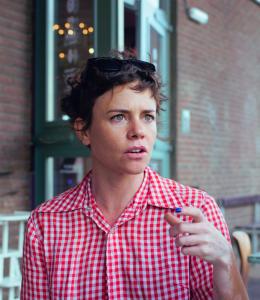
Dr Anthea Moys
British Council 90th Anniversary Research Fellow, January - December 2025
Home institution: Northumbria University
Anthea Moys (she/her) is a South African/UK-based artist and practice researcher whose work explores the intersections of play, power, and decoloniality. With a cross-disciplinary practice spanning two decades, Her approach blends arts, play-oriented studies, performance, co-production, and peer-to-peer learning. As a practitioner, her work invites people to reimagine the "rules of the game” and binaries like winning/losing and entertain new, often unwinnable, games that encourage complexity through play. After 15 years as an artist and wanting to sharpen her practice, she completed a practice research PhD at Northumbria University (2022), developing a reflexive decolonial methodology for play and performance studies. In January 2025, Moys will begin a year-long fellowship at Edinburgh University's IASH, where she will build a team between two countries: UK and SA, investigating unwinnable games through arts practice for decolonial play.
Project Title: Beyond the Binary: Unwinnable Games for Decolonial Play
Drawing on my lived and professional experience of two countries SA & UK whose relationship to colonial violence runs deep - this practice research project will, through a series of workshops in both contexts, coproduce decolonial artworks and/or tools for social change. The goal is to develop something flexible and playful that helps facilitators, educators, and artists explore complexity, embrace ambiguity, and encourage more nuanced ways of understanding each other and the world.
Here, for this practice research project, I share two past performance artworks that help explain my approach:
Boxing Games (2007 & 2018–2022) is a collaborative performance/game created with ex-South African boxing champion and coach George Khosi. Inspired by his collective training sessions, Boxing Games reimagined the rules of boxing, shifting its focus from competition and dominance to playful, emergent, and collaborative engagement. Returning to this work for my PhD research informed the decolonial reflexive practice research methodology that was developed.
What if I was the ball? (2009) draws on the aesthetics of rugby and Fluxus artist Yves Klein’s Leap into the Void (1960). In this performance, I became the “ball” in a rugby line-out with players from the junior Pirates Rugby league in Johannesburg. We enacted an unwinnable, imaginative alternative to conventional play by temporarily changing the game's rules.
Both these performances share a common goal: to create new ways of interacting by changing the rules of familiar games. They encourage people to step out of their comfort zones, take risks, trust each other, and imagine different possibilities. In today's largely polarised world, where people often feel divided, disconnected, or overwhelmed, this project aims to bridge divides through play between people from Edinburgh and Johannesburg.
